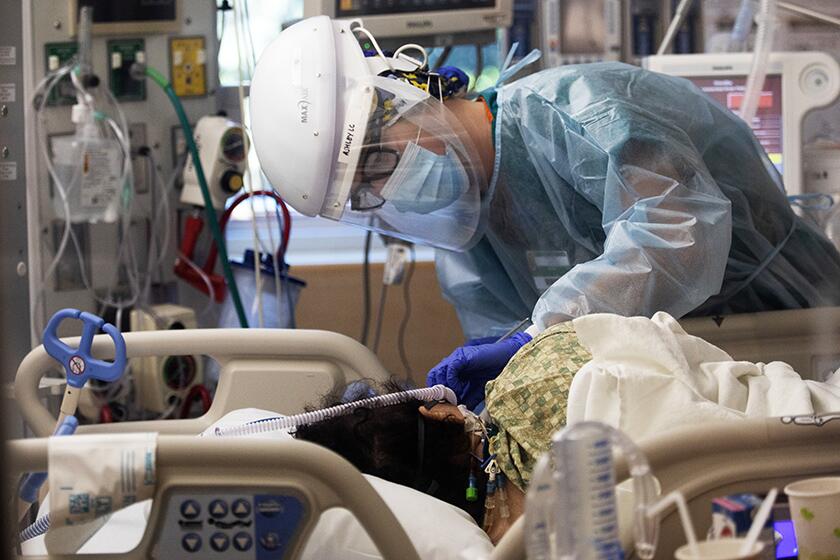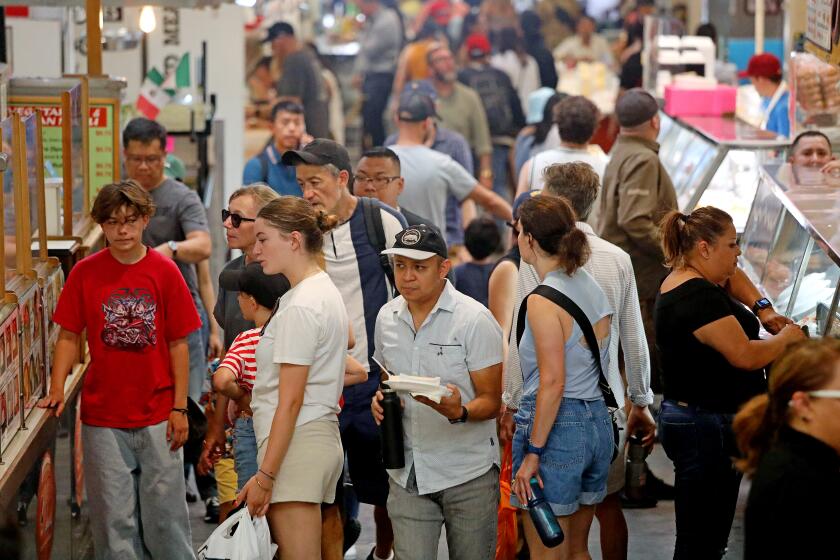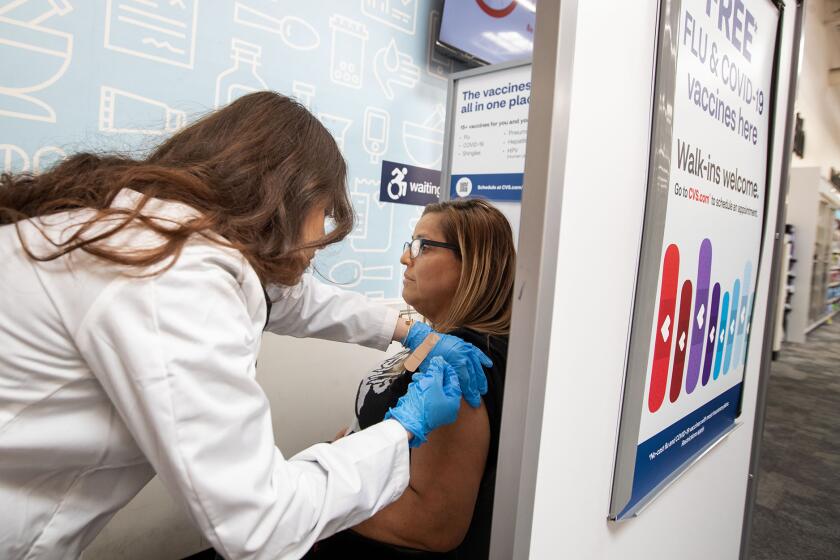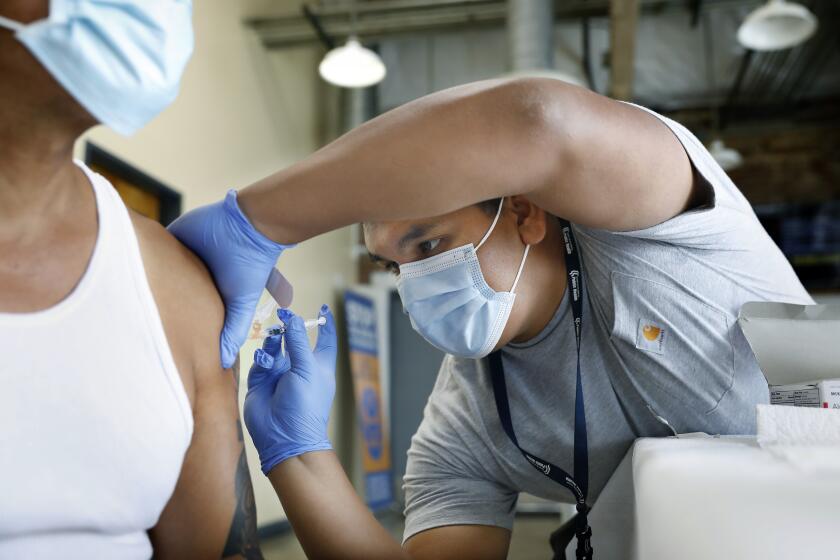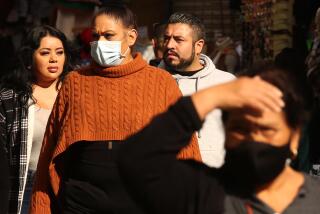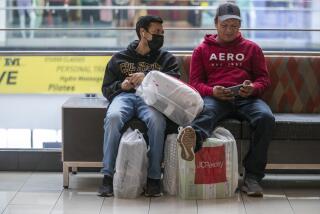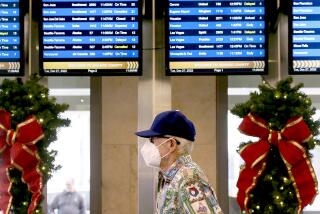Bay Area reinstates COVID mask orders in healthcare settings. Will L.A. follow?
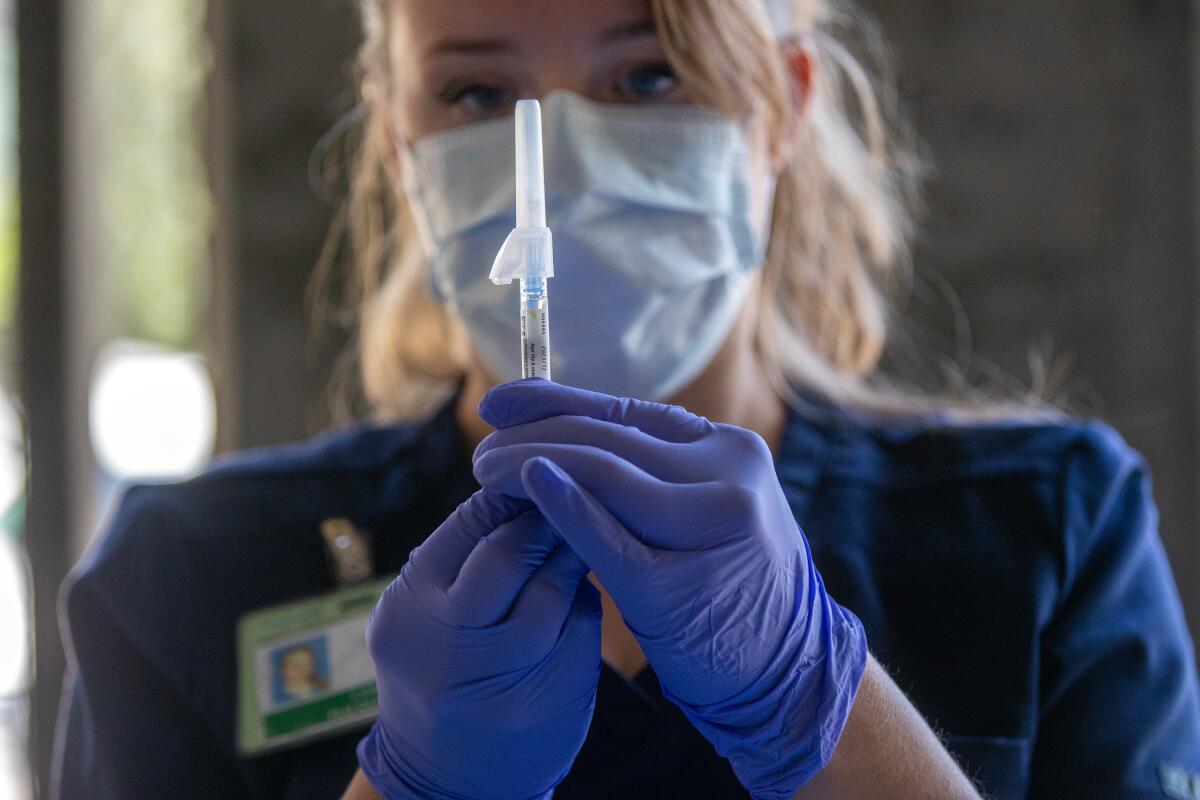
Most San Francisco Bay Area counties are reinstituting mask requirements among workers in healthcare settings, timed to coincide with the arrival of the annual respiratory illness season and an expected late-year resurgence of COVID-19.
To this point, however, Los Angeles County has not taken that same step. Rather, the county Department of Public Health issued a health order in September requiring healthcare workers to either get both the flu and updated COVID-19 vaccines or mask up when working in patient care areas.
COVID-19 conditions would have to substantially worsen for L.A. County to consider bringing back a more widespread mask mandate in healthcare settings, according to county health officer Dr. Muntu Davis.
Specifically, Davis said Tuesday, the county would need to record 20 or more new coronavirus-positive hospital admissions a week for every 100,000 residents.
The county last exceeded that threshold from mid-January to mid-February 2022, when the then-emergent Omicron variant rapidly spread worldwide, ultimately spawning the second-deadliest wave of the pandemic locally.
âAt that point, we [would be] seeing lots of severe illness ... that would be something that would tax our healthcare system,â Davis said.
Healthcare workers in Contra Costa, Alameda, Sonoma and San Mateo counties will soon have to mask up in hospitals and other indoor patient care settings.
The current rate is about four new weekly coronavirus-positive hospital admissions for every 100,000 residents.
When asked at a Board of Supervisors meeting Tuesday why L.A. County was not adopting universal masking policies at healthcare settings, Davis noted that COVID levels are still low, and both health officials and hospitals want to encourage healthcare workers to get their updated COVID-19 vaccination this autumn.
âWe felt the best thing to do at this moment was to have our healthcare workers ... get vaccinated,â Davis said.
The nationwide requirement that most healthcare workers â those working at institutions receiving federal dollars â be vaccinated against COVID-19 was lifted in August.
Only 5% of Californians have received the updated COVID-19 vaccine since it became more widely available earlier this month, and health officials say thatâs not good enough.
As of Oct. 21, the most recent data available, coronavirus levels in L.A. County wastewater were just 11% of last winterâs peak. During the height of the summer uptick in COVID-19 transmission in mid-September, viral concentrations were at 38% of last winterâs peak.
L.A. County is averaging about three COVID-19 deaths a day, fewer than the five seen after the late-summer uptick, but still higher than the mid-summer lull of about one per day. Most COVID-19 deaths are occurring among people who arenât up to date on their vaccinations, health officials say.
The county ended its masking orders for patients and visitors in healthcare settings in April, and for employees in patient-care settings in August. California also ended its statewide universal mask requirement for healthcare settings in April, but local governments can still implement more stringent orders if they see fit.
The two cities in L.A. County with their own independent public health departments have taken differing approaches. Pasadena requires that healthcare workers in patient-care areas be up to date with the latest COVID-19 vaccine, as well as wear masks in healthcare settings. Long Beach has adopted a policy similar to L.A. Countyâs.
Even absent an order, healthcare facilities can decide on their own to require masking.
Los Angeles County officials said they have no plans for new public mask mandates â a sign of how COVID-19 policies have changed in the back-to-normal era.
Farther north, most of the San Francisco Bay Area will have mask requirements for at least healthcare workers this autumn and winter.
Alameda, Contra Costa, San Mateo, Sonoma and Napa counties have issued health orders requiring employees in patient care areas to wear masks through the winter respiratory viral season â defined as Nov. 1 through April 30. Santa Cruz County, just to the south, has issued a similar order.
Santa Clara and Marin counties have gone a step further, requiring both healthcare workers and patients to wear masks during a shorter designated period: Nov. 1 through March 31.
Exempted from those orders are young children, those with a condition that prevents them from wearing a mask, those who are hearing impaired or are communicating with someone who is, and people for whom wearing a mask would create a work-related risk.
Hereâs what you need to know about flu shots and when to get them, based on the latest information from the U.S. Centers for Disease Control and Prevention.
Unlike most jurisdictions in California, San Francisco never rescinded its mask-wearing requirement for healthcare workers in patient care settings.
Berkeley, which is in Alameda County but has its own public health department, is an exception to most of the Bay Areaâs masking orders in healthcare settings, and enacted a health order similar to L.A. Countyâs.
Mendocino County, just north of the Bay Area, enacted a mask order for healthcare workers in patient care areas during its annual respiratory virus season, which this year begins Nov. 24 and ends April 30. The season will start on Oct. 1 in future years.
âEpidemiology has taught us that well-fitted, high-quality masks are very effective for protecting patients from infection ... as the infections are prevented at the source, and for protecting the wearer,â the Mendocino County health order states.
In order to move through a world where the coronavirus is endemic, we need a reliable way to assess our individual level of immunity. Hereâs how we can.
L.A. Countyâs latest health order is similar to one issued annually from 2013 until the pandemic began, which required healthcare workers either get vaccinated against flu or wear masks when in patient care areas. Since that policy was enacted, the annual flu immunization rate among the countyâs hospital-based healthcare providers rose from 58% to 86% by 2020.
Like COVID, flu levels are still relatively low. Typically, health officials consider the start of flu season to be when 5% of respiratory specimens tested at sentinel labs in L.A. County come back positive for flu. But in L.A. County, that figure is still below 2%, Davis said.
Another worrisome ailment â respiratory syncytial virus, or RSV â is already on the upswing, however, with 8% of specimens turning up positive, up from 5% the week before.
More to Read
Sign up for Essential California
The most important California stories and recommendations in your inbox every morning.
You may occasionally receive promotional content from the Los Angeles Times.
